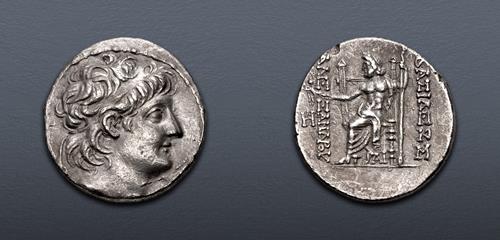|
SELEUKID EMPIRE. Alexander II Zabinas. 128-122 BC. AR Tetradrachm (28mm, 15.98 g, 1h). Antioch on the Orontes mint. Diademed head right / Zeus Nikephoros seated left; monogram to outer left, A below throne. SC 2219.2a; HGC 9, 1149d. Deposits on reverse, edge chip, cleaning scratches. VF.
Although possessing no royal blood, Alexander II Zabinas successfully usurped the Seleucid throne with the aid of the Egyptian king Ptolemy VIII Physcon. Probably the son of an Egyptian merchant named Protarchus, he claimed at different times to be the son of Alexander I Balas (150-145 BC) or the adoptive son of the last really capable Seleucid ruler, Antiochus VII Sidetes. After Sidetes’ death in 129 BC, his brother Demetrius II briefly resumed the Seleucid throne after more than a decade spent in Parthian captivity, but quickly became embroiled in an Egyptian civil war between Ptolemy VIII and his sister, Cleopatra II. Demetrius supported Cleopatra II; in retaliation, Ptolemy VIII decided to weaken the Seleucid regime by raising a usurper. He found a willing pawn in the young Alexander, inventing a fictitious lineage linking him to the Seleucid royal house, and sent him to Syria backed by a small army. The people of Antioch had few illusions about the pretender, nicknaming him “Zabinas,” or “bought one,” but their hatred for Demetrius led them to hail Alexander as king and send Demetrius fleeing to Tyre, where he was soon murdered. For a couple of years, Alexander ruled the environs of Antioch, where he was beloved for his generosity with Ptolemy VIII’s money. His coin portraits depicting with a sweet, almost girlish face quite distinct from that of other Seleucid rulers. However, most of the Seleucid empire backed a regime headed by the ferocious dowager queen Cleopatra Thea and her son Antiochus VIII Grypus (”hook-nosed”). An end to the Egyptian civil war in 125 BC caused Ptolemy VIII to cut off his support to Alexander, who resorted to looting the temples of Antioch to raise funds to pay his army. This caused his popularity to plummet, and in 123 BC the people of Antioch revolted and ejected him from the city. He was soon captured by a band of robbers and handed over to Cleopatra Thea, who summarily executed him early in 122 BC.
Closing Date and Time: 7 April 2021 at 11:08:00 ET.
All winning bids are subject to an 18% buyer’s fee.
|
